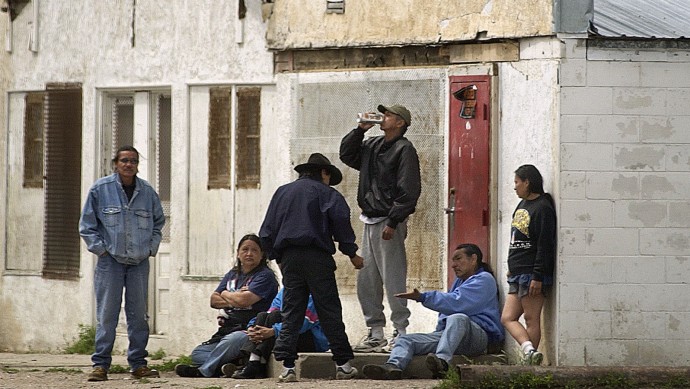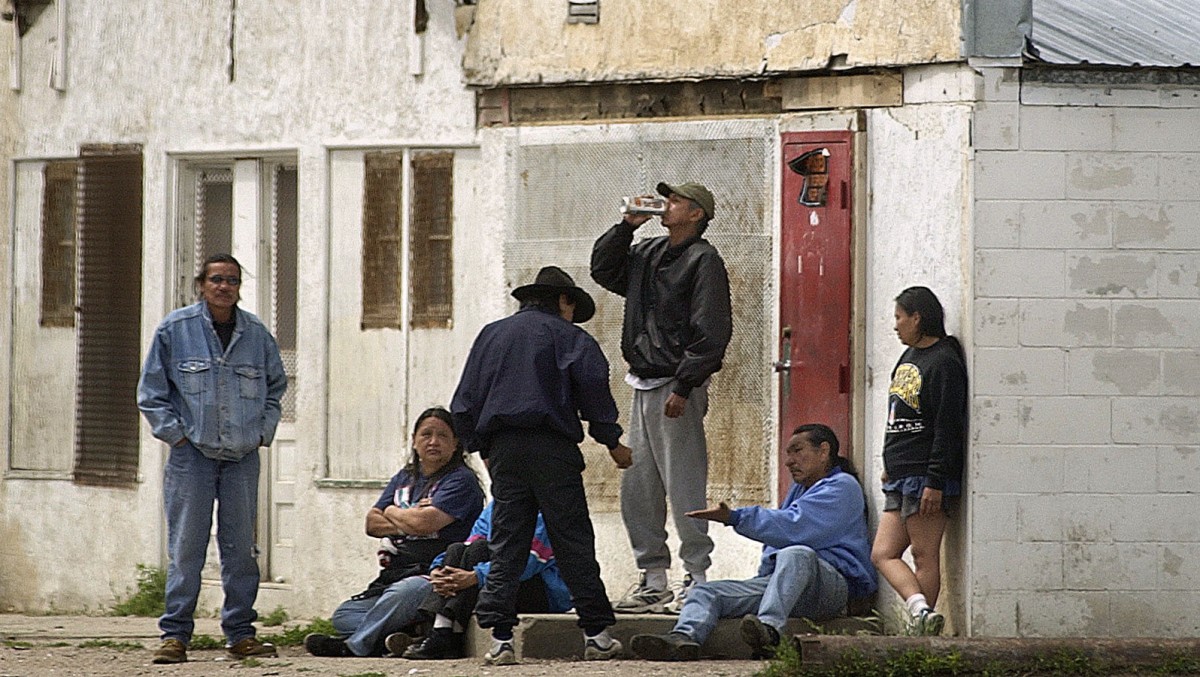
(MintPress)— Alleging that some of the world’s biggest beer brewers have knowingly contributed to devastating problems, including alcoholism, on the Pine Ridge Indian Reservation, the Oglala Sioux Tribe is suing Anheuser-Busch, Pabst Brewing Co. and others for $500 million in damages.
The lawsuit, filed in February in U.S. District Court of Nebraska, seeks for the costs the tribe has incurred in dealing with crime and providing social services and health care as a result of rampant alcoholism among its members.
Suit targets stores, distributors and brewers
The lawsuit also targets four beer stores in the small town of Whiteclay, Neb. in northwest Nebraska at the South Dakota border near the reservation.
There are only about a dozen people living in the town, but in 2010 alone, the stores sold almost 5 million cans of beer. Tribal leaders say that while alcohol is illegal on the reservation, most of the stores’ customers were from Pine Ridge.
Former Nebraska legislature Thomas White, the lawyer who is representing the tribe, told USA Today, “In a town of 11 people selling 4.9 million 12-ounce servings of beer, there is no way that alcohol could be legally consumed. It’s just impossible.”
The suit alleges the stores are responsible for bootlegging on the reservation, and that they sold the beer knowing it would be smuggled onto the reservation where it would be sold or consumed. The suit seeks to limit how much beer the retailers in the small town can sell.
“We are not saying you can’t sell beer,” White said, referencing the huge amount of beer sold in Whiteclay in 2010. “You cannot sell in volumes you know will be illegally transported and sold. You have to reduce sales to a responsible level.”
The suit also names the distributors and brewers, such as Stateline Liquor, Dietrich Distributing Co., High Plains Budweiser, Coors Distributing, Anheuser-Busch InBev, MillerCoors and Pabst Brewing Co., as it alleges that those higher up the sales and distribution chain exert pressure to maximize beer sales, White says.
As the suit was filed on behalf of the tribe, no individual tribal members are plaintiffs and eligible to receive money.
“Like American parents everywhere, we will do everything lawful we can to protect the health, welfare and future of our children,” says Oglala Sioux President John Yellow Bird Steele. The tribal council authorized the lawsuit in an effort to protect its children, he explained.
Devastating effects of alcohol seen on Pine Ridge Reservation
Alcoholism has been a huge and far-reaching problem on the reservation, where Tribal Government records show more than 20,000 tribal members living on the reservation, one of the poorest in the nation.
In addition to extreme poverty, the area reports a per capita income of $4,000, an unemployment rate of 80 to 90 percent, and the alcoholism rate is estimated as high as 80 percent.
One in four infants are born with fetal alcohol syndrome, or effects of it, and the infant mortality rate is three times the national rate.
Life expectancy on Pine Ridge is the lowest in the United States and the second lowest in the Western Hemisphere.
White filed a second amended complaint in late March, alleging that the actions of the defendants created public and private nuisances inside the Pine Ridge Reservation “by endangering and injuring the property, health, safety and comfort of a considerable number of individual members of the Oglala Sioux Tribe.” The suit is believed by White to have legal precedent in old English complaints from landowners against rowdy tavern neighbors, according to reports in local papers in South Dakota.
A date has not yet been set for the trial, but these early findings are encouraging to White, who says that the argument for recovering damages in public and private nuisance cases goes back hundreds of years to when English landowners would sue tavern neighbors for creating loud noises, drunken neighbors and objectionable behavior.
Differing perspectives on the root of the problem
Nebraskans for Peace, a nonprofit organization, has been advocating for reduced alcohol sales in Whiteclay for over a decade.
President Mark Vasina has talked with Red Cloud High School students from the reservation who say it is easy for minors to buy beer in Whiteclay. He also said he has talked with others who buy beer there with food stamps, which is illegal. In addition, an active sex trade in Whiteclay revolves around alcohol, Vasina said.
The website for the Miller Coors company says, “Ethics and responsibility play an integral part in everything we do.”
Anheuser-Busch’s website reads, “This is our world, and it’s our collective responsibility to care for it.”
However, in his letter to the New York Times, Luiz F. Edmond, North American president of Anheuser-Busch InBev, responding to news of the lawsuit wrote, “We care about the tragic problems of tribal members on the Pine Ridge Indian Reservation and are greatly concerned about alcohol abuse there and anywhere. When our products become associated with a problem, it is damaging to all of us as parents and members of communities, and to us as a company; it’s the last thing we want for our consumers or our products,” but he also says the company is not to blame for the problems on the Pine Ridge reservation.
“Beer producers are prohibited from selling beer directly to retailers or consumers in Nebraska, and we obey all laws wherever we operate or sell beer,” he wrote.
“As a Native American woman and recovering alcoholic I am grateful for Whiteclay, Nebraska for the simple reason that it keeps the disease of alcoholism and addiction right where it needs to be for our people: front and center,” wrote Mary Annette Pember in a column this week published on the Indian Country Today Media Network.
Pember, a journalist whose work focuses on Native peoples and issues and member of the Red Cliff Band of Wisconsin Ojibwe writes about her own struggle with alcohol addiction and what the lawsuit represents for Native communities.
“One day I became sick and tired of being sick and tired. I hit bottom and was morally and spiritually bankrupt. I was ready to do whatever it took to live sober. I acknowledged that addiction spirit and its power over me. How do we get other alcoholics and addicts to this jumping-off place? I have no idea. Sobriety for me was an act of God; it was gifted to me only when I accepted that my way of living life just wasn’t working. I admitted that I needed help and became willing to do whatever it took to stay sober,” Pember said.
“That addiction spirit is out to destroy us and no amount of economic development programming will change that until Native peoples take a stand and fight that spirit with any means necessary.”


